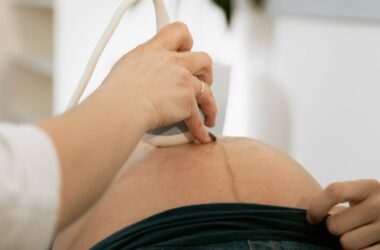Abdominal cramps in the first weeks of pregnancy
Abdominal pain or abdominal cramps are common during pregnancy. There can be several causes for this, most of which are harmless and so you don’t need to worry about them. We tell you everything you need to know about abdominal pain/abdominal cramps during pregnancy.
In this article you read all about:
Abdominal pain and pregnant
Harmless causes
Serious causes
When is it time to call your midwife?
Tips for abdominal cramps and abdominal pain
Abdominal pain and pregnant
Het is niet gek dat je gedurende je zwangerschap last krijgt van pijn in je buik en/of buikkrampen, er groeit een wondertje 9 maanden lang in je buik. Toch kunnen we het ons goed voorstellen dat je je zorgen maakt of het wel goed gaat met de baby. In de meeste gevallen is de buikpijn tijdens de zwangerschap onschuldig. Wel zijn er een paar oorzaken waarmee je het best toch even langs de verloskundige kunt gaan.
Discover and stimulate your baby's mental development
Download nowIt’s not surprising to experience abdominal pain and/or abdominal cramps during your pregnancy, a little miracle is growing inside you for 9 months. Still, we can well imagine that you are worrying if the baby is doing well. In most cases, abdominal pain during pregnancy is harmless. However, there are a few causes for which it is best to visit your midwife.
Causes of abdominal pain during pregnancy
We divide the causes of abdominal pain and/or abdominal cramps into harmless and serious causes.
Harmless causes of abdominal pain during pregnancy
Abdominal cramping during implantation
At the beginning of pregnancy, the fertilized egg will begin to nestle in the uterine wall so that it can continue to grow there. This is also known as implantation. For some women, this feels like cramps in the uterus, which may be accompanied by slight blood loss. These abdominal cramps are not harmful.
Constipation and bloating
Hormones… they have an effect on everything, including your digestion. Your digestion can change as a result. Your organs will also have to make room for your growing uterus. Altogether, this can cause you to have problems with your intestines, bloating, or even constipation. A harmless cause of abdominal pain, but certainly not pleasant.
Braxton Hicks
Abdominal cramps from 20 weeks on can also sometimes be confused with Braxton Hicks. When you have Braxton Hicks, your belly can feel hard, tense, and bloated. This is not supposed to be painful but can feel unpleasant. Braxton Hicks are common during pregnancy, but they can also be a sign that you need to take things easier. Put things aside that take a lot of effort.
Ligament pain
To keep your uterus in place, there are connective tissue bands around it. Starting the second trimester, your uterus will start to grow a lot, putting a lot more pressure on your ligaments. Especially the ligaments that run on the side of your uterus. Because of the tension on your ligaments, you may experience ligament pain. This can feel like a nagging or sharp stabbing pain in your lower abdomen. Ligament pain is not yet a cause for concern.
Serious causes of abdominal pain during pregnancy
Inflammation of the bladder
During pregnancy, you are more susceptible to cystitis than usual. This can also be a cause of pain in your lower abdomen. This is often accompanied by fever, burning when urinating, and possibly pain in your back. Fortunately, this can be treated well with antibiotics. If you have a feeling of cystitis, please contact your doctor. Be there in time, otherwise, the cystitis may grow over into pyelonephritis.
Miscarriage
The first thing pregnant women often think of when they experience abdominal pain is a miscarriage. In the first trimester, miscarriage can, unfortunately, be a cause of abdominal pain… In a first pregnancy, the chance of a miscarriage is 15%, in a subsequent pregnancy, it is 5%. With a miscarriage, you will often have blood loss, pink or brown discharge, and be accompanied by abdominal cramps. If you experience abdominal cramps with blood loss, it is wise to contact your midwife for check-ups.
Ectopic pregnancy
A slight pain in the lower abdomen at the beginning of your pregnancy may arise from an ectopic pregnancy. From 6 to 10 weeks, this pain will become more severe. If you have an ectopic pregnancy, the fertilized egg nests in a place other than the uterus, such as the fallopian tube or cervix. Outside the uterus, an embryo cannot grow and this can be very dangerous for you as a mother.
Other symptoms of an ectopic pregnancy include:
- Fainting
- Nausea
- Pain in shoulders, back, and/or thighs
- Blood loss
Endometriosis
If you suffered (had suffered) from endometriosis before pregnancy, chances are that’s what’s causing your abdominal pain. With endometriosis, tissue similar to the endometrium settles outside the uterine cavity. For example, on your intestines, bladder, and/or ovaries. During pregnancy, you will notice that these symptoms often diminish, yet endometriosis can cause (chronic) abdominal pain and intestinal cramps. During pregnancy, this can be experienced as annoying.
Detachment of the placenta
What fortunately rarely happens (in 0.2% of pregnancies) is severe and acute abdominal pain that may indicate a detaching placenta. Because the placenta is detaching, oxygen is no longer reaching the baby. It is important to act quickly. If you experience any of these symptoms, contact your midwife immediately.
Symptoms of a detaching placenta are:
- Painful and acute abdominal pain
- Blood loss
- Constant pain
- Pain where the placenta is located
- A restless uterus
Learn more about your baby’s development during pregnancy week by week!
When to contact the midwife if you experience abdominal pain during pregnancy?
Do you suspect that the abdominal pain has a serious and/or medical cause? If so, always contact your midwife. Do you have abdominal pain in combination with one or more of the symptoms below? Contact your midwife:
- Fever and/or chills
- Blood loss
- Persistent or severe pain
- Pain during urination
- Abnormal vaginal discharge
- Nausea
What can you do about pain in your abdomen during pregnancy?
In most cases, the pain in your abdomen is harmless, but this does not take away from the fact that it can cause discomfort. Hopefully, the tips below will help you alleviate abdominal pain.
- Take a warm bath to relax.
- Place a hot water bottle or nursing pillow against your belly
- Ask someone to lightly massage your abdomen or lower back
- Do you still experience a lot of pain? Then you can take paracetamol. Be sure to read the package insert carefully. Make sure the paracetamol does not contain codeine!
Did this article help you?
Share this article
Receive a notification at the start of a leap!
Would you like to be prepared when your baby is about to enter a leap? Sign up for our leap alarm for free and always receive a notification when a leap is about to start!




